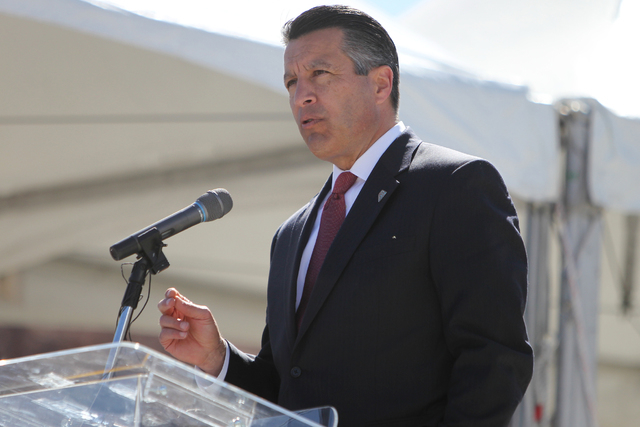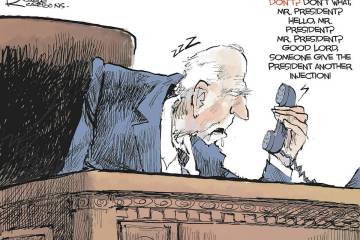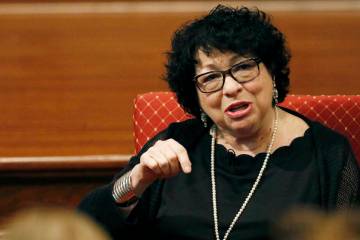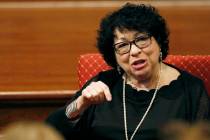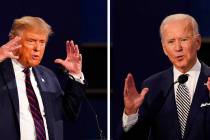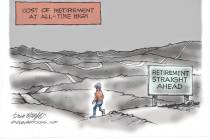EDITORIAL: Compromise state tax plan still not worthy of permanence
Give Gov. Brian Sandoval credit for backing off a fight he couldn’t win.
The keystone of his plan to fund a $7.4 billion budget, a business license fee based on a company’s gross receipts, did not have the votes to pass the Assembly. So instead of playing a high-stakes game of political chicken with members of his own party — an approach guaranteed to push the Legislature past its constitutionally required June 2 adjournment and into special session — Gov. Sandoval proposed a new funding plan based on lawmakers’ own ideas.
The Republican assured lawmakers he was open to other ideas to fund his budget, which needs record tax increases to support new education spending, and lawmakers responded.
But the compromise plan unveiled Thursday is far from settled — and far from perfect. It must receive a new round of vetting from lawmakers and the Nevada businesses that will pay the taxes it contains. As legislative leaders consider the effects the plan might have on the state’s economy in trying to round up the support of two-thirds of their colleagues, they must be concerned with much more than paying the state’s bills for two years. They must ask themselves, “Is this tax policy good enough to be made permanent?”
As with Gov. Sandoval’s original tax plan, the compromise plan puts the bulk of the burden of new education spending on Nevada businesses. The governor’s original plan would have changed a flat $200 state business license fee to a tiered fee of between $400 and $4 million. Different industries would have paid different effective tax rates based on gross revenues. The Republican-controlled Senate passed the plan 17-4, but Assembly Republicans were much less supportive of a levy that bore resemblance to the margins tax rejected last year by 79 percent of Nevada voters.
The new tax plan, which is projected to generate more than $500 million over the two-year budget cycle, has three components and combines proposals from Republican Assemblymen Paul Anderson and Derek Armstrong and Sen. Patricia Spearman, D-North Las Vegas. The business license fee would remain flat, increasing from $200 to $300 for most businesses and $500 for corporations. The existing modified business tax on company payrolls would increase from 1.17 percent to 1.475 percent — the banking and mining industries would pay a 2 percent rate — while the tax exemption would fall from $340,000 to $200,000. The final component, being called a “commerce tax,” hits the gross receipts of companies with at least $3.5 million in annual revenue at industry-specific rates that are still being negotiated.
The new plan is an improvement in two ways. First, companies that pay the commerce tax would be able to apply 50 percent of that levy as a credit against the modified business tax. That reduces the burden on high-revenue, high-overhead, low-margin companies. Second, it insulates small businesses from huge new tax bills.
But its greatest shortcomings are unchanged. It’s a big blow to businesses that have only begun to recover from the Great Recession in the state with the country’s highest unemployment rate. Gross receipts taxes, which are assessed by only a handful of states, hit all levels of commerce, not just final sales. And industry-specific rates invite a constitutional challenge because they aren’t equal and uniform.
It’s too late in the game to expect lawmakers to agree on a funding mechanism that’s radically different — especially when there is overwhelming support for the governor’s budget and his plan to transform Nevada’s underperforming concerns. But lawmakers have time to make the plan better — now and in the future.
For starters, lawmakers could make a reformed live entertainment tax, as proposed by Assembly Minority Leader Marilyn Kirkpatrick, D-North Las Vegas, a larger part of their funding plan. The tax should reach nightclubs and more special events. Then they could make the commerce tax, the higher payroll tax and perhaps the higher business license fee expire in 2017, with the goal of extending the sales tax to services that year. By then, the state should have adequate data on the service sector to impose a uniform tax rate on everything from dry cleaning to landscape maintenance. It would be simpler, fairer, more transparent and more voluntary than any of the proposed business tax increases.
The revised business tax plan should be seen not as a permanent solution to funding state government, but as a temporary one.



